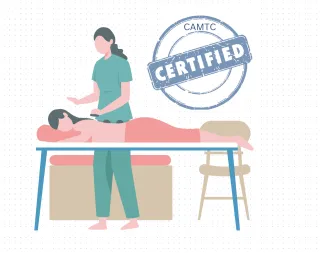MEET OUR EXPERT THERAPISTS
dedicated to guiding you on your journey to optimal health and pain-free living.

Jenny LY

Jariah Vue

Michelle Lejander
STEP INTO OUR SOOTHING THERAPY ROOMS
where every detail is designed to create a calm and restorative environment for your healing journey.

Experience the difference that personalized, holistic care can make.
Book your appointment today and take the first step towards
A HEALTHIER, PAIN-FREE LIFE
What is the difference between Licensed Massage Therapist(LMT) and Certified Massage Therapists(CMT) in California?
Certified Massage Therapists(CMT) is a certification granted to a massage practitioner by a state regulatory body in Sacramento, California Massage Therapy Council, popularly known as CAMTC after completing minimum of 500 hours of academic education including training in massage therapy, from CAMTC approved massage schools and successfully clearing CAMTC approved examination. All massage therapists are subject to ongoing compliance and reporting requirements which means any criminal charges and convictions must be reported promptly to CAMTC and any disqualifying criminal conviction would prevent certification and recertification.
California is one of six states that don't have licensing requirements. A certification from CAMTC is a qualifying requirement for granting a license to practice massage therapy in most parts of California. In addition to rigorous academic standards, it also mandates 24 hours of continuous education every 2 years for a renewal. In nutshell, CMT is a certification and continuous education program overseen by CAMTC while LMT refers to an approval granted by a local regulatory body and scope of practice permissions.
At iBliss Wellness, all massage therapists are licensed and certified. They are also certified in various programs such as lymphatic drainage, oncology massage, myofascial release and nueromuscular massage. They are highly experienced and worked in health care facilities under the supervision of doctor of physical therapy and doctor of massage therapy.

Is it appropriate to call my massage therapist a masseuse?
While the term "masseuse" has been traditionally used to refer to a female massage therapist, it is generally considered outdated and sometimes carries a negative connotation. The male equivalent, "masseur," is also less commonly used today.
Here are some reasons why it's more appropriate to use the term "massage therapist":
1. Professionalism
Massage Therapist: This term emphasizes the professional nature of the field, highlighting the training, certification, and expertise required to practice.
Masseuse/Masseur: These terms can seem less formal and may not fully convey the professional qualifications and skills of the practitioner.
2. Gender Neutrality
Massage Therapist: It is a gender-neutral term that can be used to describe both male and female practitioners, promoting inclusivity and avoiding gender-specific language.
Masseuse/Masseur: These terms are gender-specific, which can be limiting and not inclusive of all professionals in the field.
3. Avoiding Negative Connotations
Massage Therapist: Using this term avoids any potential misunderstandings or associations with illicit activities that the terms "masseuse" or "masseur" might sometimes carry.
Masseuse/Masseur: In some contexts, these terms have been historically associated with the adult entertainment industry, which can lead to misconceptions about the profession.
4. Industry Standards
Massage Therapist: This is the term preferred by professional organizations, licensing boards, and certification bodies within the industry, reflecting the standardized training and ethical practices upheld by practitioners.
Masseuse/Masseur: These terms are not commonly used by professional bodies and might not reflect the modern standards of the profession.
For these reasons, it is more appropriate and respectful to refer to a professional in this field as a "massage therapist." This term better reflects the professionalism, gender neutrality, and contemporary standards of the industry.

